First-Time in Japan? 10 Essential Travel Tips Every Visitor Needs to Know
Japan is one of the most fascinating countries to visit—rich in culture, full of beauty, and incredibly safe.
But if it’s your first time traveling to Japan, things might feel a little… different.
From train etiquette to SIM cards, here are 10 essential travel tips every first-time visitor to Japan should know.
- 1. Bring Cash in Japan – Credit Cards Are Not Always Accepted
- 2. No Tipping in Japan – Service Charges Included
- 3. Learn Basic Japanese Phrases for Travel
- 4. Train & Subway Etiquette in Japan
- 5. Buy and Use Prepaid IC Cards (Suica / ICOCA)
- 6. Internet in Japan: eSIM, Pocket Wi-Fi, and SIM Cards
- 7. Japanese Convenience Stores (Conbini) – What You Can Buy
- 8. Japan’s Clean Streets – Carry a Trash Bag
- 9. Book Hotels Early in Japan’s Peak Seasons
- 10. Book Hotels Early in Japan’s Peak Seasons
- 🌟 Final Thoughts
1. Bring Cash in Japan – Credit Cards Are Not Always Accepted
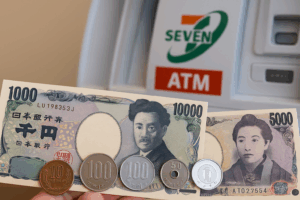
Japan is gradually becoming more card-friendly, but many small restaurants, shrines, markets, and even some hotels still prefer cash.
💡 Tip: ATMs at 7-Eleven or Lawson convenience stores accept most international cards and are the most reliable.
2. No Tipping in Japan – Service Charges Included

Tipping is not customary in Japan. In fact, it can be seen as awkward or even rude.
Service charges are included in the bill—and you’ll find the service to be exceptional regardless.
If you leave money on the table, expect the staff to chase you down to return it!
3. Learn Basic Japanese Phrases for Travel
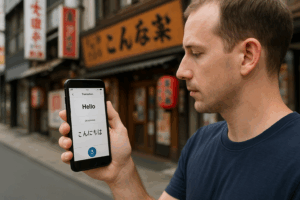
Japanese people are kind and helpful, but English fluency can be limited outside major cities.
Knowing a few words like:
- “Arigatou” (Thank you)
- “Sumimasen” (Excuse me / Sorry)
-
“Eigo wakarimasu ka?” (Do you understand English?)
…can make a big difference.
💡 Tip: Download Google Translate and use the camera feature for menus or signs.
4. Train & Subway Etiquette in Japan
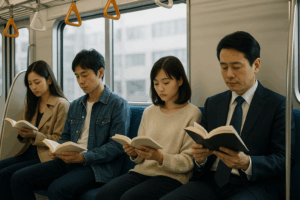
Japan’s trains are punctual, clean, and quiet. Very quiet.
When using public transport:
- Avoid talking on the phone
- Keep conversations soft
- Offer seats to elderly, pregnant women, or people with disabilities
-
Line up properly before boarding
Being mindful of others is deeply valued in Japan.
5. Buy and Use Prepaid IC Cards (Suica / ICOCA)
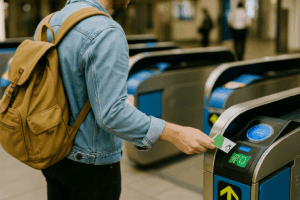
Suica and ICOCA are rechargeable IC cards that let you pay for trains, buses, vending machines, and even items at convenience stores.
If you’re traveling to eastern Japan, such as Tokyo, you can purchase a Suica card at JR East stations, including Narita Airport and Haneda Airport.
If you’re heading to western Japan, including Osaka and Kyoto, you can buy an ICOCA card at JR West stations, such as Kansai International Airport (KIX).
Both Suica and ICOCA are widely accepted and can be used almost anywhere across Japan.
Learn more at JR East Official Site or JR West Official Site.
6. Internet in Japan: eSIM, Pocket Wi-Fi, and SIM Cards

Free Wi-Fi in Japan is limited and often unreliable, especially on trains or in rural areas. To stay connected throughout your trip—for navigation, translations, train schedules, and emergency updates—consider one of the following reliable options:
1. Rent a Pocket Wi-Fi (Great for groups or multiple devices)
- No SIM card or setup required—just turn it on and connect.
- Ideal for families, couples, or digital nomads who want fast and unlimited internet.
Recommended providers:
- 🔗 Sakura Mobile Pocket Wi-Fi – English support, airport pickup, unlimited data.
- 🔗 Japan Wireless – Online rental, flexible plans, highly rated by tourists.
2. Use a SIM Card or eSIM (Great for solo travelers or long stays)
- Requires an unlocked phone.
- eSIMs can be downloaded in advance before arriving in Japan.
Recommended providers:
- 🔗 Mobal Japan SIM – Prepaid, includes Japanese phone number.
- 🔗 Airalo eSIM for Japan – Activate instantly via mobile app, no shipping needed.
- 🔗 Sakura Mobile SIM – Airport pickup, excellent customer support in English.
💡 If you prefer to buy a SIM card after arriving in Japan, you can also find prepaid SIMs at major electronics stores like Yodobashi Camera and Bic Camera. These usually include products from b-mobile and DHA Mobile, but they may offer limited English support.
7. Japanese Convenience Stores (Conbini) – What You Can Buy

Japan’s convenience stores—called “conbini”—are incredibly useful for travelers. Open 24/7 and found on almost every street corner, these stores offer a wide selection of affordable and high-quality products.
Here are some of the most useful things you can buy:
- Onigiri (rice balls) – A quick, tasty snack with fillings like tuna mayo, salmon, or pickled plum.
- Bento lunch boxes – Freshly prepared meals perfect for lunch, dinner, or a train ride.
- Drinks – Green tea, bottled water, canned coffee, soft drinks, and even alcohol.
- Snacks and sweets – Japanese chips, chocolate, cookies, and seasonal treats.
- Toiletries and daily essentials – Toothbrushes, tissues, hand sanitizer, deodorant, and razors.
- Umbrellas – Inexpensive plastic umbrellas for sudden weather changes.
- Phone accessories – SIM cards, chargers, portable batteries, and cables.
-
Basic medicine – Cold remedies, painkillers, and eye drops.
Popular chains include 7-Eleven, FamilyMart, and Lawson.
Each store is clean, efficient, and stocked with everything a traveler might need.
8. Japan’s Clean Streets – Carry a Trash Bag
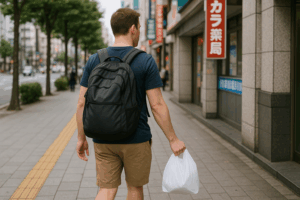
You’ll be surprised by how clean Japan is—despite the fact that trash bins are rare in public places.
This is because people take their garbage home.
Bring a small plastic bag with you to carry trash until you find a bin (usually at convenience stores or train stations).
9. Book Hotels Early in Japan’s Peak Seasons
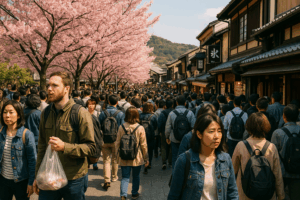
Japan has several peak travel seasons when hotels and guesthouses fill up quickly, sometimes months in advance. These include:
- 🌸 Cherry blossom season (late March to early April)
- 🍁 Autumn foliage season (mid-November to early December)
- 🎌 Golden Week (late April to early May)
During these periods, demand for accommodation in popular cities like Tokyo, Kyoto, Osaka, and Nikko is extremely high. Prices also tend to surge, and last-minute availability becomes very limited.
To avoid stress and inflated costs, we highly recommend booking your stay as early as possible—especially if you’re traveling to scenic areas famous for cherry blossoms or fall colors.
Recommended hotel booking platforms:
- Booking.com – Japan Hotels – Wide selection, free cancellation on most rooms
- Agoda – Hotels in Japan – Great deals and Asian-language support
- Trip.com – Hotels & Travel in Japan – Multilingual support and good deals.
10. Book Hotels Early in Japan’s Peak Seasons
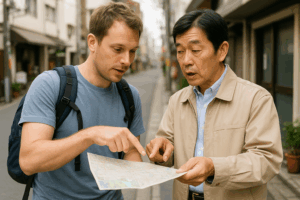
Even if they don’t speak English fluently, most Japanese people will go out of their way to help you.
If you get lost or confused, don’t hesitate to ask politely. You may even get walked to your destination!
🌟 Final Thoughts
Traveling to Japan is exciting and rewarding—but preparation makes a big difference.
By keeping these 10 tips in mind, you’ll feel confident navigating new customs and enjoy a smoother, more immersive experience.
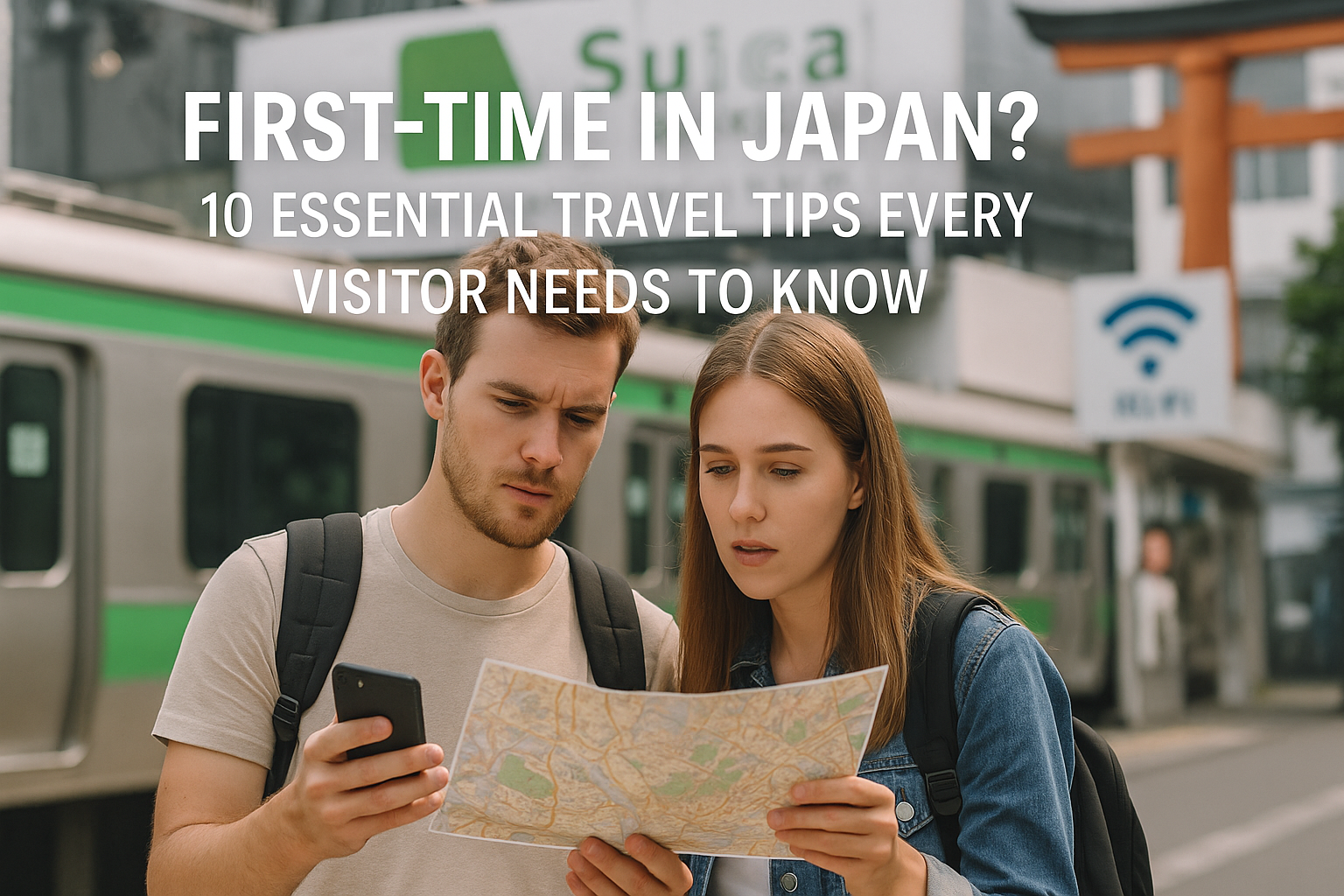

コメント